Strategic Report: Tesco's Expansion into the Australian Market
VerifiedAdded on 2023/06/13
|14
|3792
|441
Report
AI Summary
This macro-analysis report examines the potential for British multinational retailer Tesco to expand into the Australian market. It considers Australia's economic stability, political landscape, and cultural factors, concluding that Australia presents a favorable environment for Tesco's expansion. The report delves into economic data, trade agreements, and rankings, alongside political and legal analyses focusing on governmental roles, legal systems, and property rights. A cultural analysis explores ethical considerations and contemporary issues, including financial services and the aging population. Ultimately, the report suggests that Australia offers substantial opportunities for Tesco, emphasizing the importance of understanding consumer preferences and navigating regulatory environments. Desklib provides access to similar solved assignments and past papers for students.
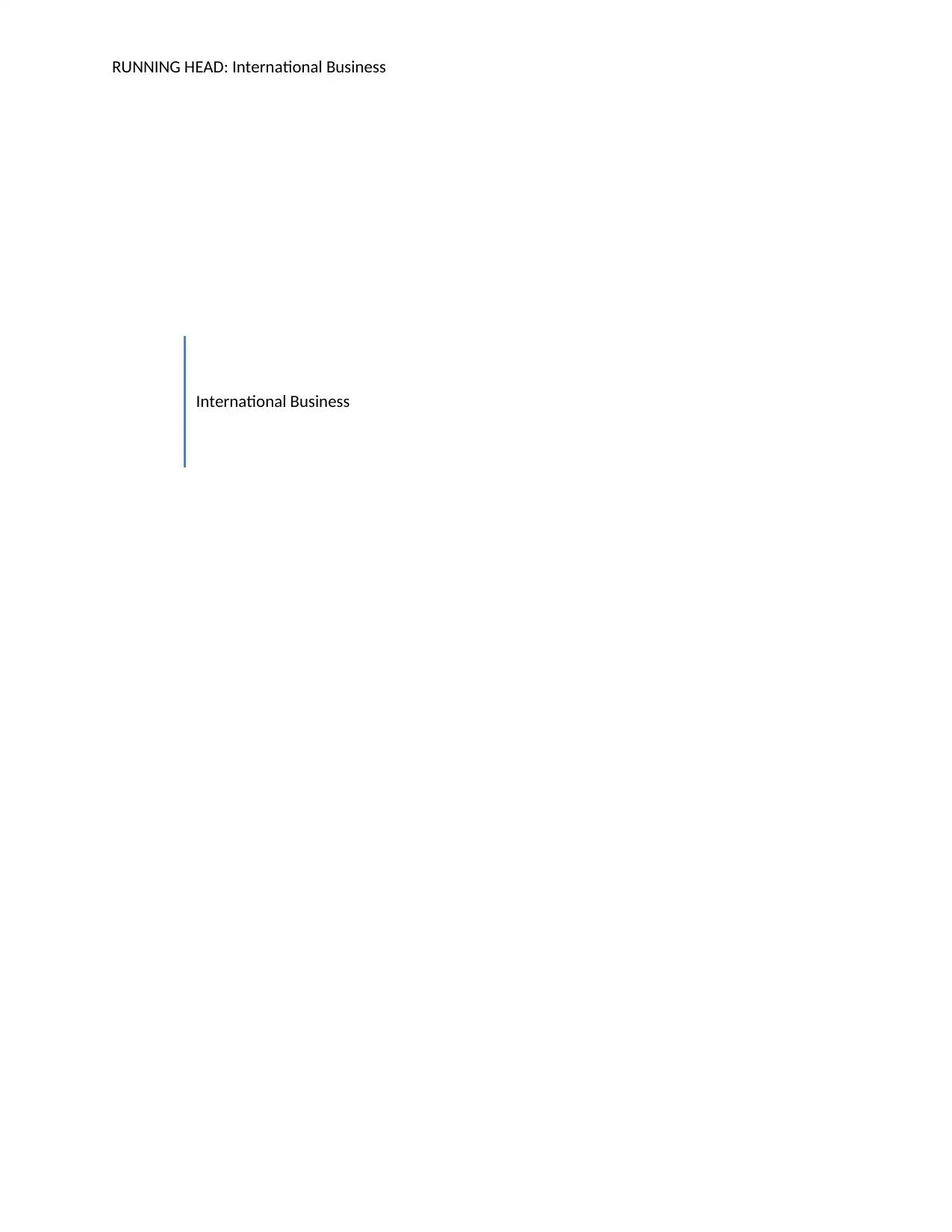
RUNNING HEAD: International Business
International Business
International Business
Paraphrase This Document
Need a fresh take? Get an instant paraphrase of this document with our AI Paraphraser
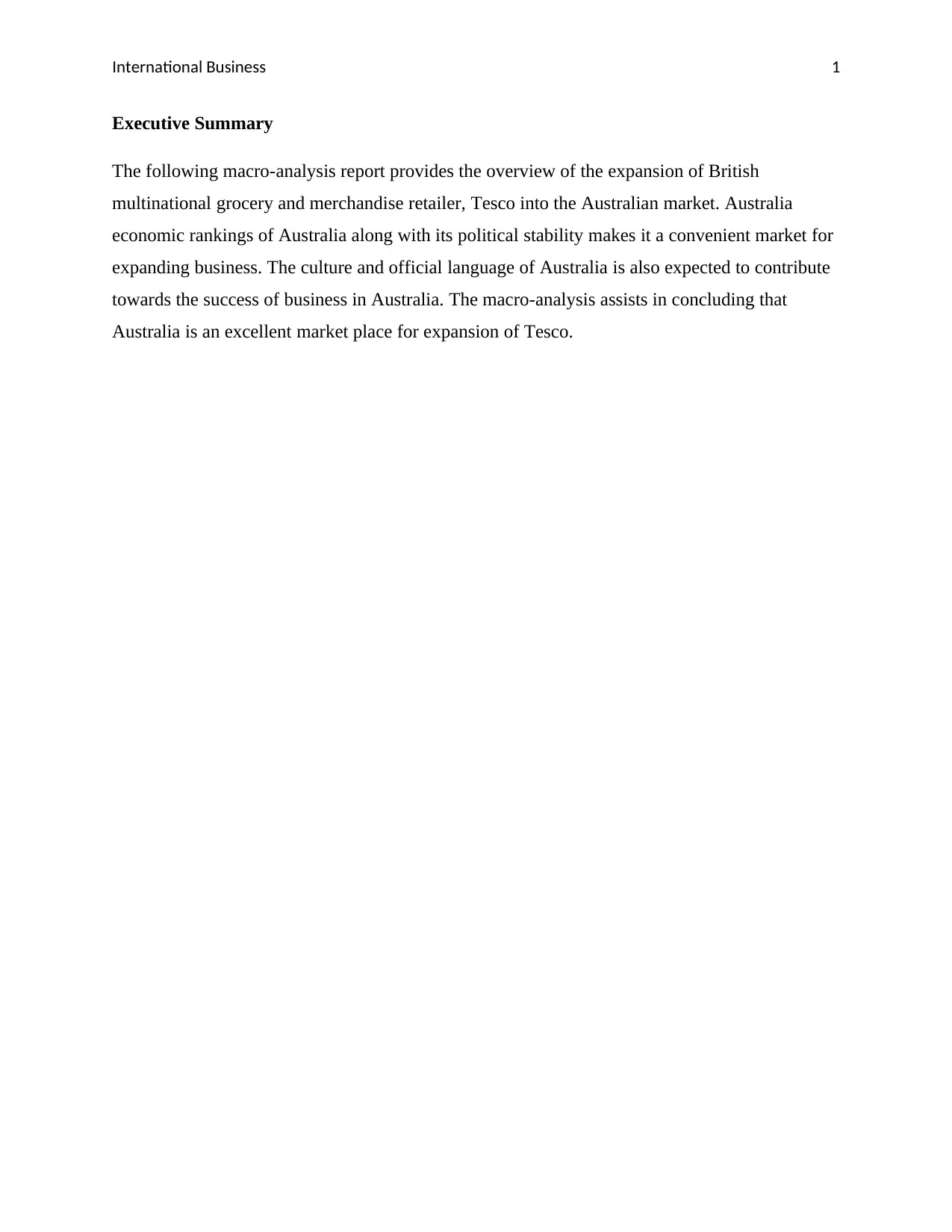
International Business 1
Executive Summary
The following macro-analysis report provides the overview of the expansion of British
multinational grocery and merchandise retailer, Tesco into the Australian market. Australia
economic rankings of Australia along with its political stability makes it a convenient market for
expanding business. The culture and official language of Australia is also expected to contribute
towards the success of business in Australia. The macro-analysis assists in concluding that
Australia is an excellent market place for expansion of Tesco.
Executive Summary
The following macro-analysis report provides the overview of the expansion of British
multinational grocery and merchandise retailer, Tesco into the Australian market. Australia
economic rankings of Australia along with its political stability makes it a convenient market for
expanding business. The culture and official language of Australia is also expected to contribute
towards the success of business in Australia. The macro-analysis assists in concluding that
Australia is an excellent market place for expansion of Tesco.
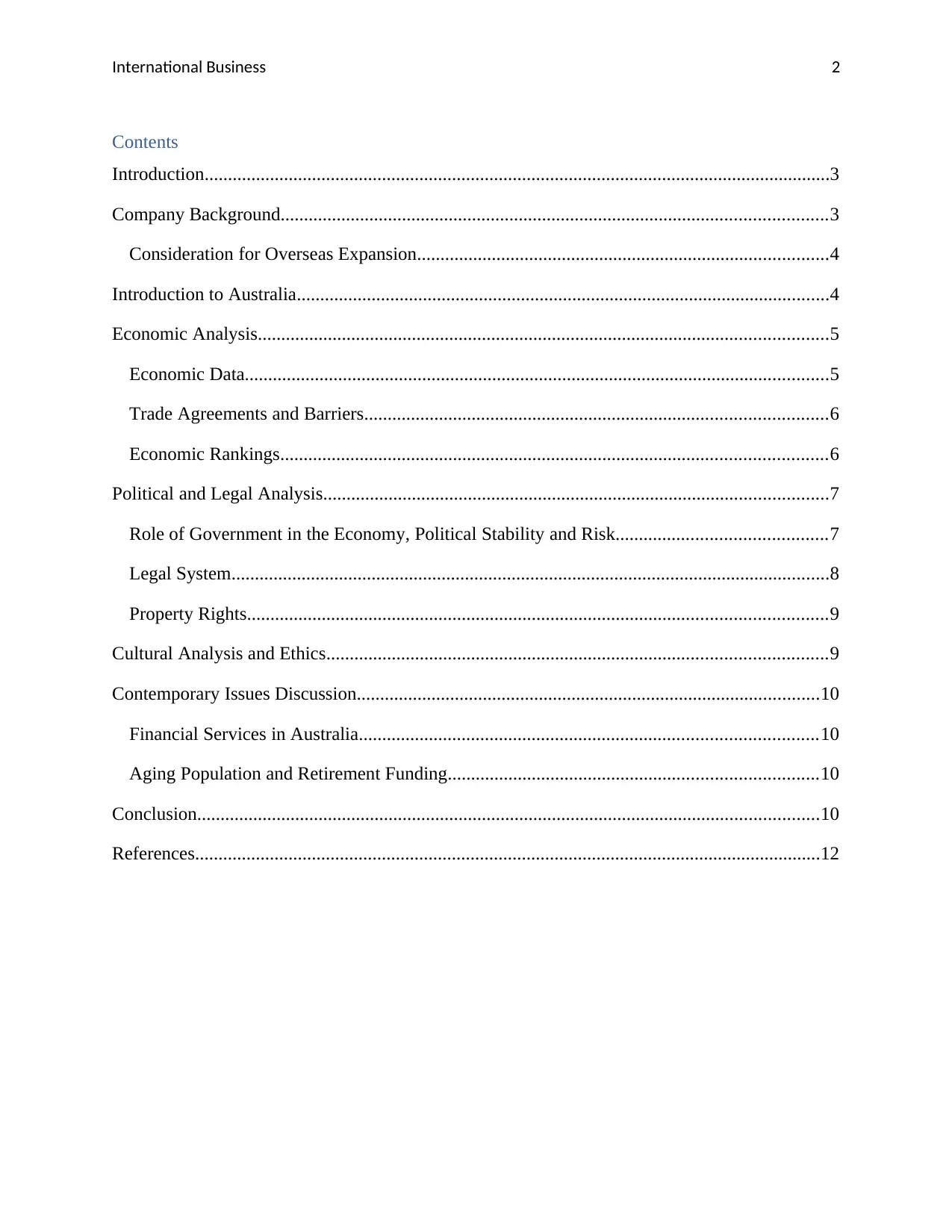
International Business 2
Contents
Introduction......................................................................................................................................3
Company Background.....................................................................................................................3
Consideration for Overseas Expansion........................................................................................4
Introduction to Australia..................................................................................................................4
Economic Analysis..........................................................................................................................5
Economic Data.............................................................................................................................5
Trade Agreements and Barriers...................................................................................................6
Economic Rankings.....................................................................................................................6
Political and Legal Analysis............................................................................................................7
Role of Government in the Economy, Political Stability and Risk.............................................7
Legal System................................................................................................................................8
Property Rights............................................................................................................................9
Cultural Analysis and Ethics...........................................................................................................9
Contemporary Issues Discussion...................................................................................................10
Financial Services in Australia..................................................................................................10
Aging Population and Retirement Funding...............................................................................10
Conclusion.....................................................................................................................................10
References......................................................................................................................................12
Contents
Introduction......................................................................................................................................3
Company Background.....................................................................................................................3
Consideration for Overseas Expansion........................................................................................4
Introduction to Australia..................................................................................................................4
Economic Analysis..........................................................................................................................5
Economic Data.............................................................................................................................5
Trade Agreements and Barriers...................................................................................................6
Economic Rankings.....................................................................................................................6
Political and Legal Analysis............................................................................................................7
Role of Government in the Economy, Political Stability and Risk.............................................7
Legal System................................................................................................................................8
Property Rights............................................................................................................................9
Cultural Analysis and Ethics...........................................................................................................9
Contemporary Issues Discussion...................................................................................................10
Financial Services in Australia..................................................................................................10
Aging Population and Retirement Funding...............................................................................10
Conclusion.....................................................................................................................................10
References......................................................................................................................................12
⊘ This is a preview!⊘
Do you want full access?
Subscribe today to unlock all pages.

Trusted by 1+ million students worldwide
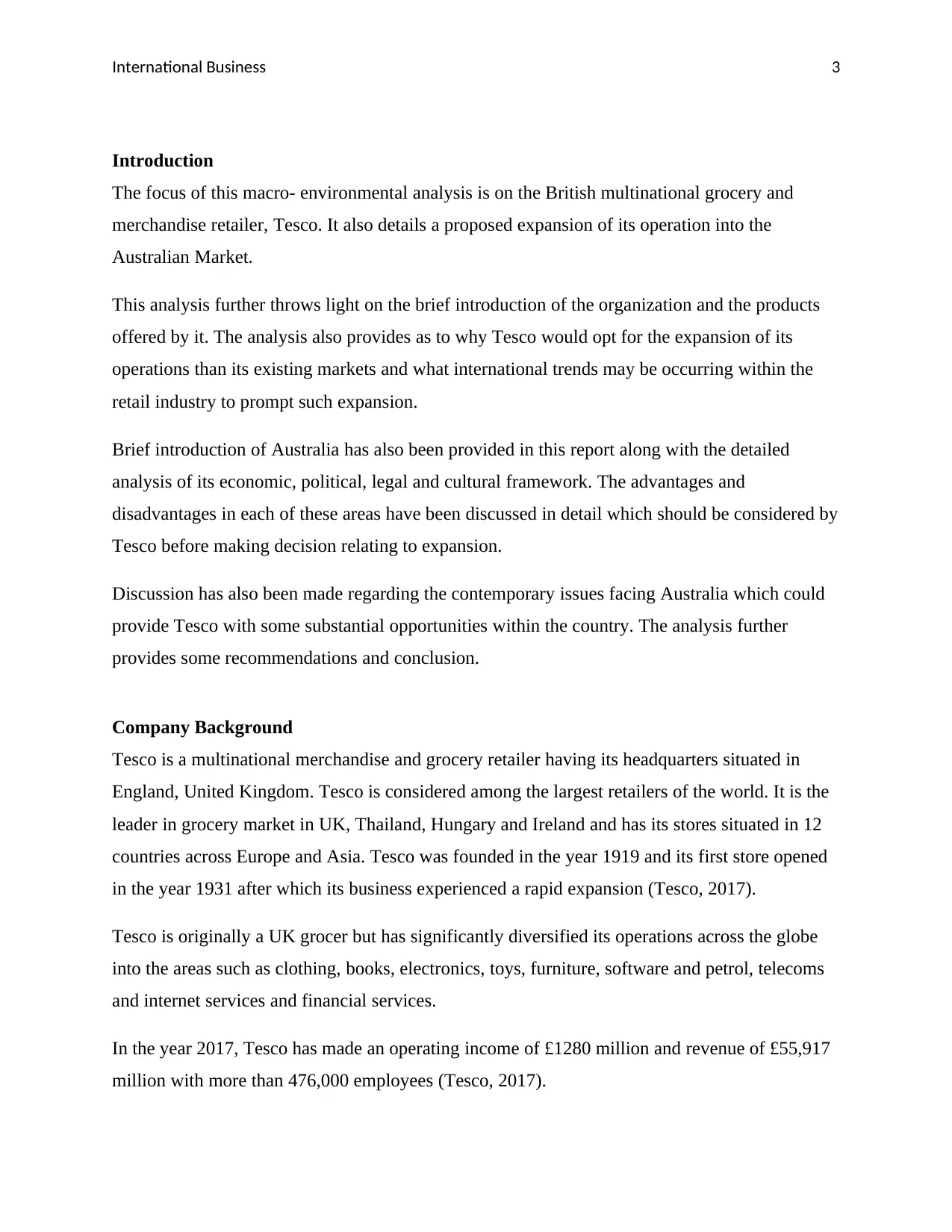
International Business 3
Introduction
The focus of this macro- environmental analysis is on the British multinational grocery and
merchandise retailer, Tesco. It also details a proposed expansion of its operation into the
Australian Market.
This analysis further throws light on the brief introduction of the organization and the products
offered by it. The analysis also provides as to why Tesco would opt for the expansion of its
operations than its existing markets and what international trends may be occurring within the
retail industry to prompt such expansion.
Brief introduction of Australia has also been provided in this report along with the detailed
analysis of its economic, political, legal and cultural framework. The advantages and
disadvantages in each of these areas have been discussed in detail which should be considered by
Tesco before making decision relating to expansion.
Discussion has also been made regarding the contemporary issues facing Australia which could
provide Tesco with some substantial opportunities within the country. The analysis further
provides some recommendations and conclusion.
Company Background
Tesco is a multinational merchandise and grocery retailer having its headquarters situated in
England, United Kingdom. Tesco is considered among the largest retailers of the world. It is the
leader in grocery market in UK, Thailand, Hungary and Ireland and has its stores situated in 12
countries across Europe and Asia. Tesco was founded in the year 1919 and its first store opened
in the year 1931 after which its business experienced a rapid expansion (Tesco, 2017).
Tesco is originally a UK grocer but has significantly diversified its operations across the globe
into the areas such as clothing, books, electronics, toys, furniture, software and petrol, telecoms
and internet services and financial services.
In the year 2017, Tesco has made an operating income of £1280 million and revenue of £55,917
million with more than 476,000 employees (Tesco, 2017).
Introduction
The focus of this macro- environmental analysis is on the British multinational grocery and
merchandise retailer, Tesco. It also details a proposed expansion of its operation into the
Australian Market.
This analysis further throws light on the brief introduction of the organization and the products
offered by it. The analysis also provides as to why Tesco would opt for the expansion of its
operations than its existing markets and what international trends may be occurring within the
retail industry to prompt such expansion.
Brief introduction of Australia has also been provided in this report along with the detailed
analysis of its economic, political, legal and cultural framework. The advantages and
disadvantages in each of these areas have been discussed in detail which should be considered by
Tesco before making decision relating to expansion.
Discussion has also been made regarding the contemporary issues facing Australia which could
provide Tesco with some substantial opportunities within the country. The analysis further
provides some recommendations and conclusion.
Company Background
Tesco is a multinational merchandise and grocery retailer having its headquarters situated in
England, United Kingdom. Tesco is considered among the largest retailers of the world. It is the
leader in grocery market in UK, Thailand, Hungary and Ireland and has its stores situated in 12
countries across Europe and Asia. Tesco was founded in the year 1919 and its first store opened
in the year 1931 after which its business experienced a rapid expansion (Tesco, 2017).
Tesco is originally a UK grocer but has significantly diversified its operations across the globe
into the areas such as clothing, books, electronics, toys, furniture, software and petrol, telecoms
and internet services and financial services.
In the year 2017, Tesco has made an operating income of £1280 million and revenue of £55,917
million with more than 476,000 employees (Tesco, 2017).
Paraphrase This Document
Need a fresh take? Get an instant paraphrase of this document with our AI Paraphraser
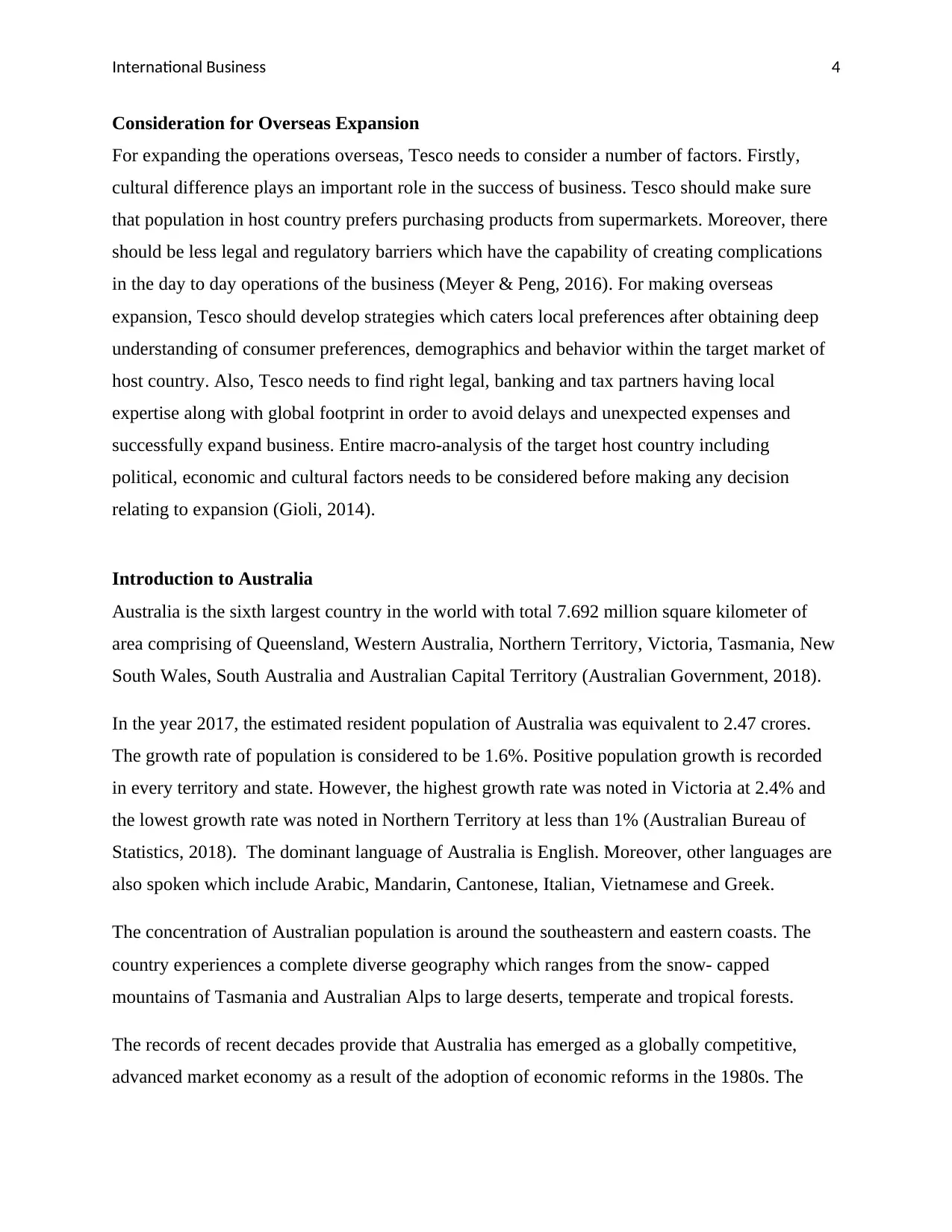
International Business 4
Consideration for Overseas Expansion
For expanding the operations overseas, Tesco needs to consider a number of factors. Firstly,
cultural difference plays an important role in the success of business. Tesco should make sure
that population in host country prefers purchasing products from supermarkets. Moreover, there
should be less legal and regulatory barriers which have the capability of creating complications
in the day to day operations of the business (Meyer & Peng, 2016). For making overseas
expansion, Tesco should develop strategies which caters local preferences after obtaining deep
understanding of consumer preferences, demographics and behavior within the target market of
host country. Also, Tesco needs to find right legal, banking and tax partners having local
expertise along with global footprint in order to avoid delays and unexpected expenses and
successfully expand business. Entire macro-analysis of the target host country including
political, economic and cultural factors needs to be considered before making any decision
relating to expansion (Gioli, 2014).
Introduction to Australia
Australia is the sixth largest country in the world with total 7.692 million square kilometer of
area comprising of Queensland, Western Australia, Northern Territory, Victoria, Tasmania, New
South Wales, South Australia and Australian Capital Territory (Australian Government, 2018).
In the year 2017, the estimated resident population of Australia was equivalent to 2.47 crores.
The growth rate of population is considered to be 1.6%. Positive population growth is recorded
in every territory and state. However, the highest growth rate was noted in Victoria at 2.4% and
the lowest growth rate was noted in Northern Territory at less than 1% (Australian Bureau of
Statistics, 2018). The dominant language of Australia is English. Moreover, other languages are
also spoken which include Arabic, Mandarin, Cantonese, Italian, Vietnamese and Greek.
The concentration of Australian population is around the southeastern and eastern coasts. The
country experiences a complete diverse geography which ranges from the snow- capped
mountains of Tasmania and Australian Alps to large deserts, temperate and tropical forests.
The records of recent decades provide that Australia has emerged as a globally competitive,
advanced market economy as a result of the adoption of economic reforms in the 1980s. The
Consideration for Overseas Expansion
For expanding the operations overseas, Tesco needs to consider a number of factors. Firstly,
cultural difference plays an important role in the success of business. Tesco should make sure
that population in host country prefers purchasing products from supermarkets. Moreover, there
should be less legal and regulatory barriers which have the capability of creating complications
in the day to day operations of the business (Meyer & Peng, 2016). For making overseas
expansion, Tesco should develop strategies which caters local preferences after obtaining deep
understanding of consumer preferences, demographics and behavior within the target market of
host country. Also, Tesco needs to find right legal, banking and tax partners having local
expertise along with global footprint in order to avoid delays and unexpected expenses and
successfully expand business. Entire macro-analysis of the target host country including
political, economic and cultural factors needs to be considered before making any decision
relating to expansion (Gioli, 2014).
Introduction to Australia
Australia is the sixth largest country in the world with total 7.692 million square kilometer of
area comprising of Queensland, Western Australia, Northern Territory, Victoria, Tasmania, New
South Wales, South Australia and Australian Capital Territory (Australian Government, 2018).
In the year 2017, the estimated resident population of Australia was equivalent to 2.47 crores.
The growth rate of population is considered to be 1.6%. Positive population growth is recorded
in every territory and state. However, the highest growth rate was noted in Victoria at 2.4% and
the lowest growth rate was noted in Northern Territory at less than 1% (Australian Bureau of
Statistics, 2018). The dominant language of Australia is English. Moreover, other languages are
also spoken which include Arabic, Mandarin, Cantonese, Italian, Vietnamese and Greek.
The concentration of Australian population is around the southeastern and eastern coasts. The
country experiences a complete diverse geography which ranges from the snow- capped
mountains of Tasmania and Australian Alps to large deserts, temperate and tropical forests.
The records of recent decades provide that Australia has emerged as a globally competitive,
advanced market economy as a result of the adoption of economic reforms in the 1980s. The
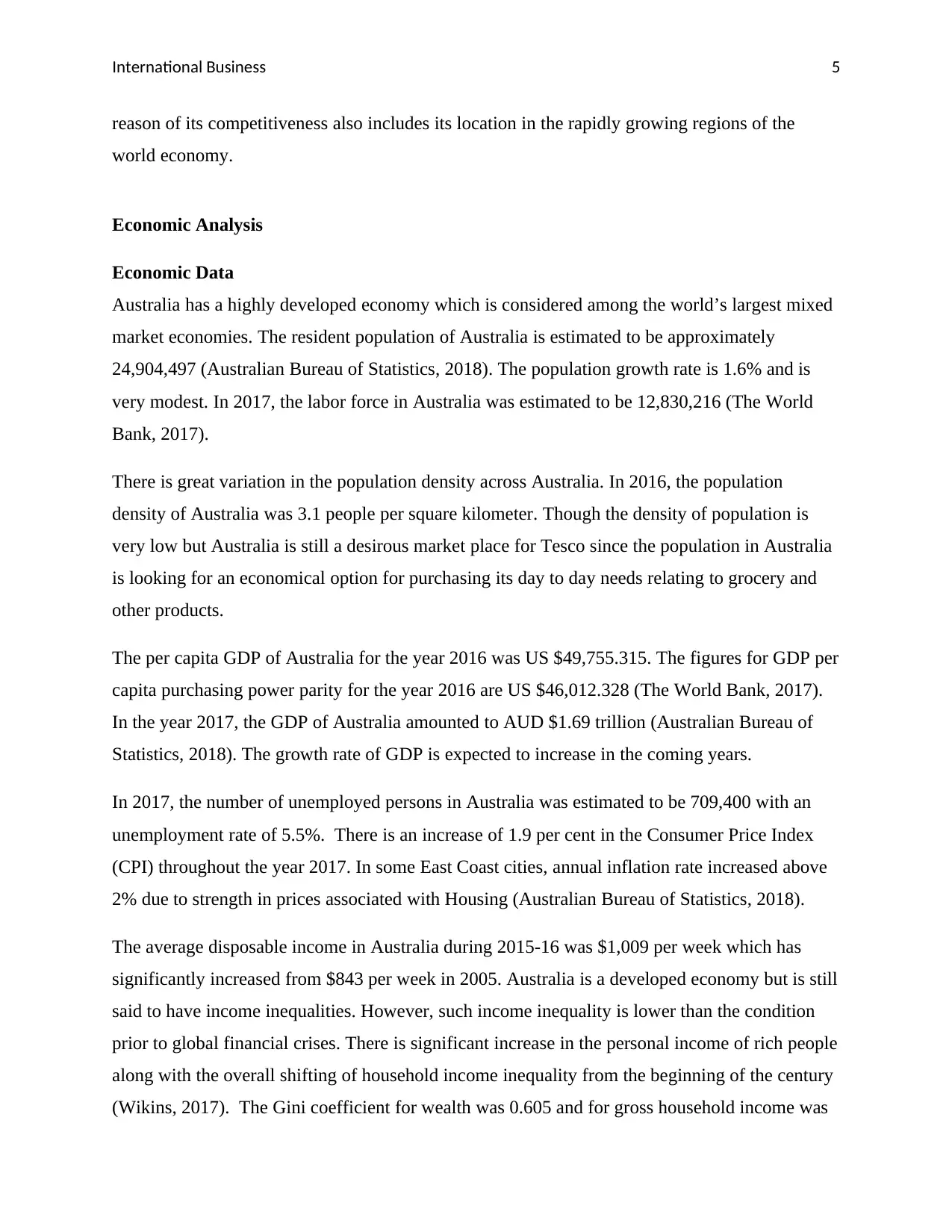
International Business 5
reason of its competitiveness also includes its location in the rapidly growing regions of the
world economy.
Economic Analysis
Economic Data
Australia has a highly developed economy which is considered among the world’s largest mixed
market economies. The resident population of Australia is estimated to be approximately
24,904,497 (Australian Bureau of Statistics, 2018). The population growth rate is 1.6% and is
very modest. In 2017, the labor force in Australia was estimated to be 12,830,216 (The World
Bank, 2017).
There is great variation in the population density across Australia. In 2016, the population
density of Australia was 3.1 people per square kilometer. Though the density of population is
very low but Australia is still a desirous market place for Tesco since the population in Australia
is looking for an economical option for purchasing its day to day needs relating to grocery and
other products.
The per capita GDP of Australia for the year 2016 was US $49,755.315. The figures for GDP per
capita purchasing power parity for the year 2016 are US $46,012.328 (The World Bank, 2017).
In the year 2017, the GDP of Australia amounted to AUD $1.69 trillion (Australian Bureau of
Statistics, 2018). The growth rate of GDP is expected to increase in the coming years.
In 2017, the number of unemployed persons in Australia was estimated to be 709,400 with an
unemployment rate of 5.5%. There is an increase of 1.9 per cent in the Consumer Price Index
(CPI) throughout the year 2017. In some East Coast cities, annual inflation rate increased above
2% due to strength in prices associated with Housing (Australian Bureau of Statistics, 2018).
The average disposable income in Australia during 2015-16 was $1,009 per week which has
significantly increased from $843 per week in 2005. Australia is a developed economy but is still
said to have income inequalities. However, such income inequality is lower than the condition
prior to global financial crises. There is significant increase in the personal income of rich people
along with the overall shifting of household income inequality from the beginning of the century
(Wikins, 2017). The Gini coefficient for wealth was 0.605 and for gross household income was
reason of its competitiveness also includes its location in the rapidly growing regions of the
world economy.
Economic Analysis
Economic Data
Australia has a highly developed economy which is considered among the world’s largest mixed
market economies. The resident population of Australia is estimated to be approximately
24,904,497 (Australian Bureau of Statistics, 2018). The population growth rate is 1.6% and is
very modest. In 2017, the labor force in Australia was estimated to be 12,830,216 (The World
Bank, 2017).
There is great variation in the population density across Australia. In 2016, the population
density of Australia was 3.1 people per square kilometer. Though the density of population is
very low but Australia is still a desirous market place for Tesco since the population in Australia
is looking for an economical option for purchasing its day to day needs relating to grocery and
other products.
The per capita GDP of Australia for the year 2016 was US $49,755.315. The figures for GDP per
capita purchasing power parity for the year 2016 are US $46,012.328 (The World Bank, 2017).
In the year 2017, the GDP of Australia amounted to AUD $1.69 trillion (Australian Bureau of
Statistics, 2018). The growth rate of GDP is expected to increase in the coming years.
In 2017, the number of unemployed persons in Australia was estimated to be 709,400 with an
unemployment rate of 5.5%. There is an increase of 1.9 per cent in the Consumer Price Index
(CPI) throughout the year 2017. In some East Coast cities, annual inflation rate increased above
2% due to strength in prices associated with Housing (Australian Bureau of Statistics, 2018).
The average disposable income in Australia during 2015-16 was $1,009 per week which has
significantly increased from $843 per week in 2005. Australia is a developed economy but is still
said to have income inequalities. However, such income inequality is lower than the condition
prior to global financial crises. There is significant increase in the personal income of rich people
along with the overall shifting of household income inequality from the beginning of the century
(Wikins, 2017). The Gini coefficient for wealth was 0.605 and for gross household income was
⊘ This is a preview!⊘
Do you want full access?
Subscribe today to unlock all pages.

Trusted by 1+ million students worldwide
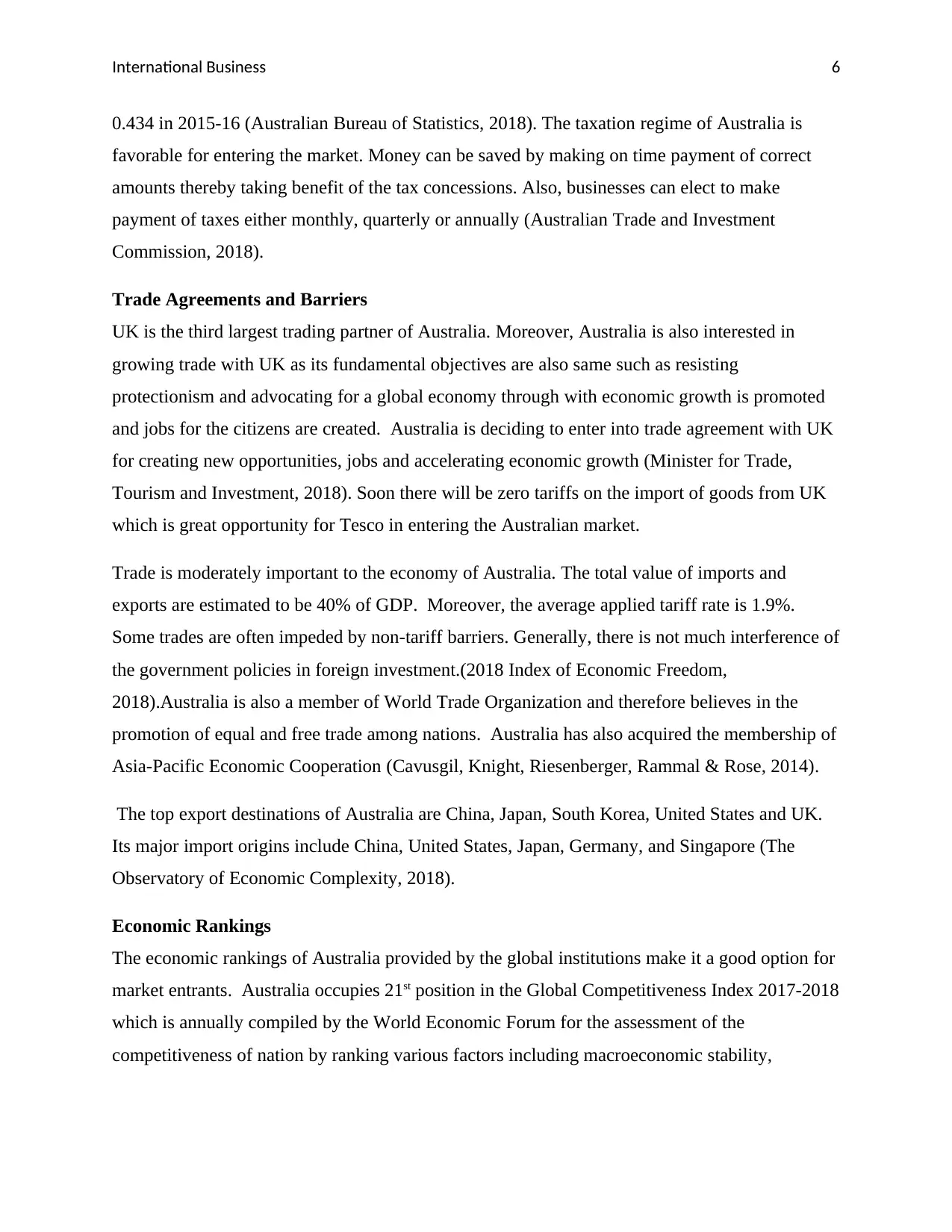
International Business 6
0.434 in 2015-16 (Australian Bureau of Statistics, 2018). The taxation regime of Australia is
favorable for entering the market. Money can be saved by making on time payment of correct
amounts thereby taking benefit of the tax concessions. Also, businesses can elect to make
payment of taxes either monthly, quarterly or annually (Australian Trade and Investment
Commission, 2018).
Trade Agreements and Barriers
UK is the third largest trading partner of Australia. Moreover, Australia is also interested in
growing trade with UK as its fundamental objectives are also same such as resisting
protectionism and advocating for a global economy through with economic growth is promoted
and jobs for the citizens are created. Australia is deciding to enter into trade agreement with UK
for creating new opportunities, jobs and accelerating economic growth (Minister for Trade,
Tourism and Investment, 2018). Soon there will be zero tariffs on the import of goods from UK
which is great opportunity for Tesco in entering the Australian market.
Trade is moderately important to the economy of Australia. The total value of imports and
exports are estimated to be 40% of GDP. Moreover, the average applied tariff rate is 1.9%.
Some trades are often impeded by non-tariff barriers. Generally, there is not much interference of
the government policies in foreign investment.(2018 Index of Economic Freedom,
2018).Australia is also a member of World Trade Organization and therefore believes in the
promotion of equal and free trade among nations. Australia has also acquired the membership of
Asia-Pacific Economic Cooperation (Cavusgil, Knight, Riesenberger, Rammal & Rose, 2014).
The top export destinations of Australia are China, Japan, South Korea, United States and UK.
Its major import origins include China, United States, Japan, Germany, and Singapore (The
Observatory of Economic Complexity, 2018).
Economic Rankings
The economic rankings of Australia provided by the global institutions make it a good option for
market entrants. Australia occupies 21st position in the Global Competitiveness Index 2017-2018
which is annually compiled by the World Economic Forum for the assessment of the
competitiveness of nation by ranking various factors including macroeconomic stability,
0.434 in 2015-16 (Australian Bureau of Statistics, 2018). The taxation regime of Australia is
favorable for entering the market. Money can be saved by making on time payment of correct
amounts thereby taking benefit of the tax concessions. Also, businesses can elect to make
payment of taxes either monthly, quarterly or annually (Australian Trade and Investment
Commission, 2018).
Trade Agreements and Barriers
UK is the third largest trading partner of Australia. Moreover, Australia is also interested in
growing trade with UK as its fundamental objectives are also same such as resisting
protectionism and advocating for a global economy through with economic growth is promoted
and jobs for the citizens are created. Australia is deciding to enter into trade agreement with UK
for creating new opportunities, jobs and accelerating economic growth (Minister for Trade,
Tourism and Investment, 2018). Soon there will be zero tariffs on the import of goods from UK
which is great opportunity for Tesco in entering the Australian market.
Trade is moderately important to the economy of Australia. The total value of imports and
exports are estimated to be 40% of GDP. Moreover, the average applied tariff rate is 1.9%.
Some trades are often impeded by non-tariff barriers. Generally, there is not much interference of
the government policies in foreign investment.(2018 Index of Economic Freedom,
2018).Australia is also a member of World Trade Organization and therefore believes in the
promotion of equal and free trade among nations. Australia has also acquired the membership of
Asia-Pacific Economic Cooperation (Cavusgil, Knight, Riesenberger, Rammal & Rose, 2014).
The top export destinations of Australia are China, Japan, South Korea, United States and UK.
Its major import origins include China, United States, Japan, Germany, and Singapore (The
Observatory of Economic Complexity, 2018).
Economic Rankings
The economic rankings of Australia provided by the global institutions make it a good option for
market entrants. Australia occupies 21st position in the Global Competitiveness Index 2017-2018
which is annually compiled by the World Economic Forum for the assessment of the
competitiveness of nation by ranking various factors including macroeconomic stability,
Paraphrase This Document
Need a fresh take? Get an instant paraphrase of this document with our AI Paraphraser
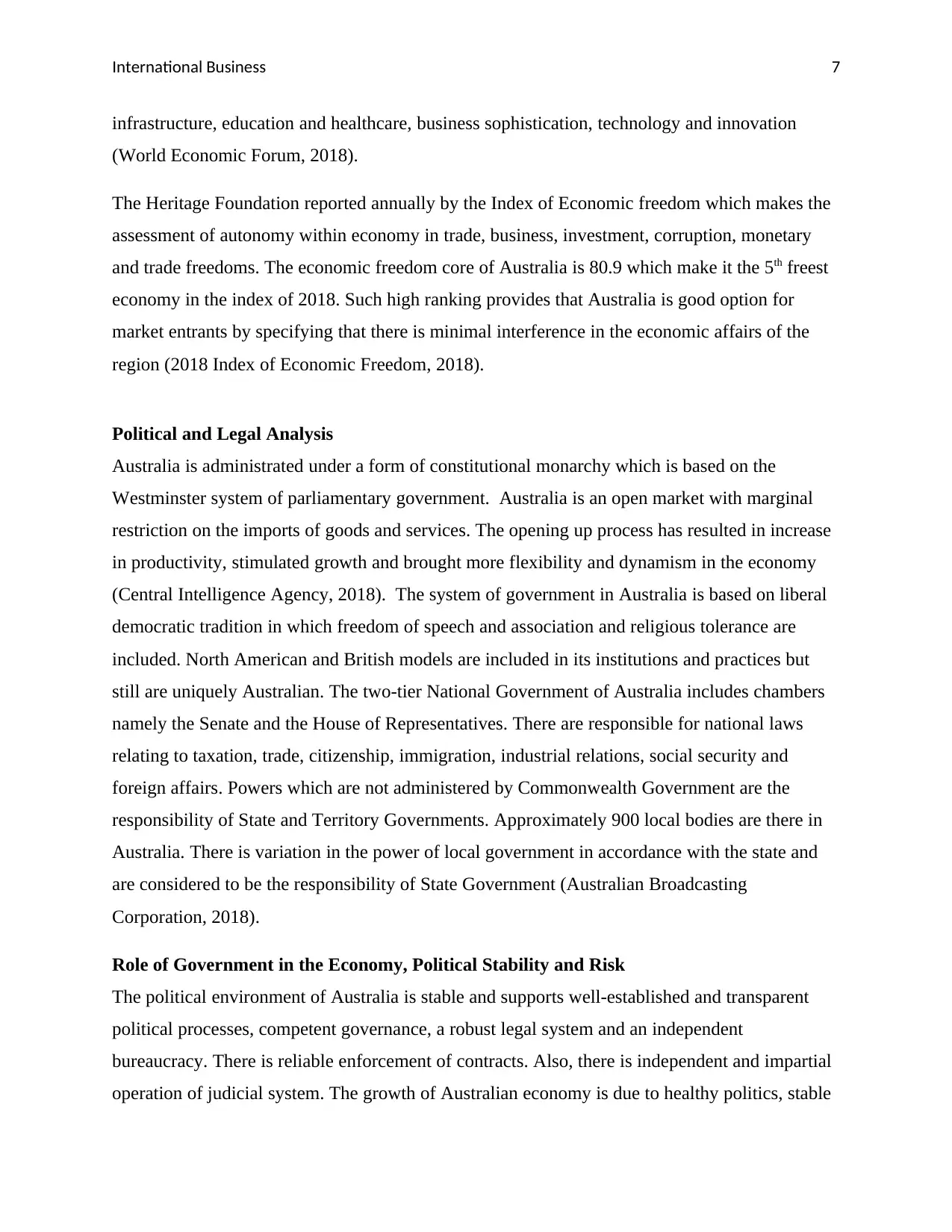
International Business 7
infrastructure, education and healthcare, business sophistication, technology and innovation
(World Economic Forum, 2018).
The Heritage Foundation reported annually by the Index of Economic freedom which makes the
assessment of autonomy within economy in trade, business, investment, corruption, monetary
and trade freedoms. The economic freedom core of Australia is 80.9 which make it the 5th freest
economy in the index of 2018. Such high ranking provides that Australia is good option for
market entrants by specifying that there is minimal interference in the economic affairs of the
region (2018 Index of Economic Freedom, 2018).
Political and Legal Analysis
Australia is administrated under a form of constitutional monarchy which is based on the
Westminster system of parliamentary government. Australia is an open market with marginal
restriction on the imports of goods and services. The opening up process has resulted in increase
in productivity, stimulated growth and brought more flexibility and dynamism in the economy
(Central Intelligence Agency, 2018). The system of government in Australia is based on liberal
democratic tradition in which freedom of speech and association and religious tolerance are
included. North American and British models are included in its institutions and practices but
still are uniquely Australian. The two-tier National Government of Australia includes chambers
namely the Senate and the House of Representatives. There are responsible for national laws
relating to taxation, trade, citizenship, immigration, industrial relations, social security and
foreign affairs. Powers which are not administered by Commonwealth Government are the
responsibility of State and Territory Governments. Approximately 900 local bodies are there in
Australia. There is variation in the power of local government in accordance with the state and
are considered to be the responsibility of State Government (Australian Broadcasting
Corporation, 2018).
Role of Government in the Economy, Political Stability and Risk
The political environment of Australia is stable and supports well-established and transparent
political processes, competent governance, a robust legal system and an independent
bureaucracy. There is reliable enforcement of contracts. Also, there is independent and impartial
operation of judicial system. The growth of Australian economy is due to healthy politics, stable
infrastructure, education and healthcare, business sophistication, technology and innovation
(World Economic Forum, 2018).
The Heritage Foundation reported annually by the Index of Economic freedom which makes the
assessment of autonomy within economy in trade, business, investment, corruption, monetary
and trade freedoms. The economic freedom core of Australia is 80.9 which make it the 5th freest
economy in the index of 2018. Such high ranking provides that Australia is good option for
market entrants by specifying that there is minimal interference in the economic affairs of the
region (2018 Index of Economic Freedom, 2018).
Political and Legal Analysis
Australia is administrated under a form of constitutional monarchy which is based on the
Westminster system of parliamentary government. Australia is an open market with marginal
restriction on the imports of goods and services. The opening up process has resulted in increase
in productivity, stimulated growth and brought more flexibility and dynamism in the economy
(Central Intelligence Agency, 2018). The system of government in Australia is based on liberal
democratic tradition in which freedom of speech and association and religious tolerance are
included. North American and British models are included in its institutions and practices but
still are uniquely Australian. The two-tier National Government of Australia includes chambers
namely the Senate and the House of Representatives. There are responsible for national laws
relating to taxation, trade, citizenship, immigration, industrial relations, social security and
foreign affairs. Powers which are not administered by Commonwealth Government are the
responsibility of State and Territory Governments. Approximately 900 local bodies are there in
Australia. There is variation in the power of local government in accordance with the state and
are considered to be the responsibility of State Government (Australian Broadcasting
Corporation, 2018).
Role of Government in the Economy, Political Stability and Risk
The political environment of Australia is stable and supports well-established and transparent
political processes, competent governance, a robust legal system and an independent
bureaucracy. There is reliable enforcement of contracts. Also, there is independent and impartial
operation of judicial system. The growth of Australian economy is due to healthy politics, stable
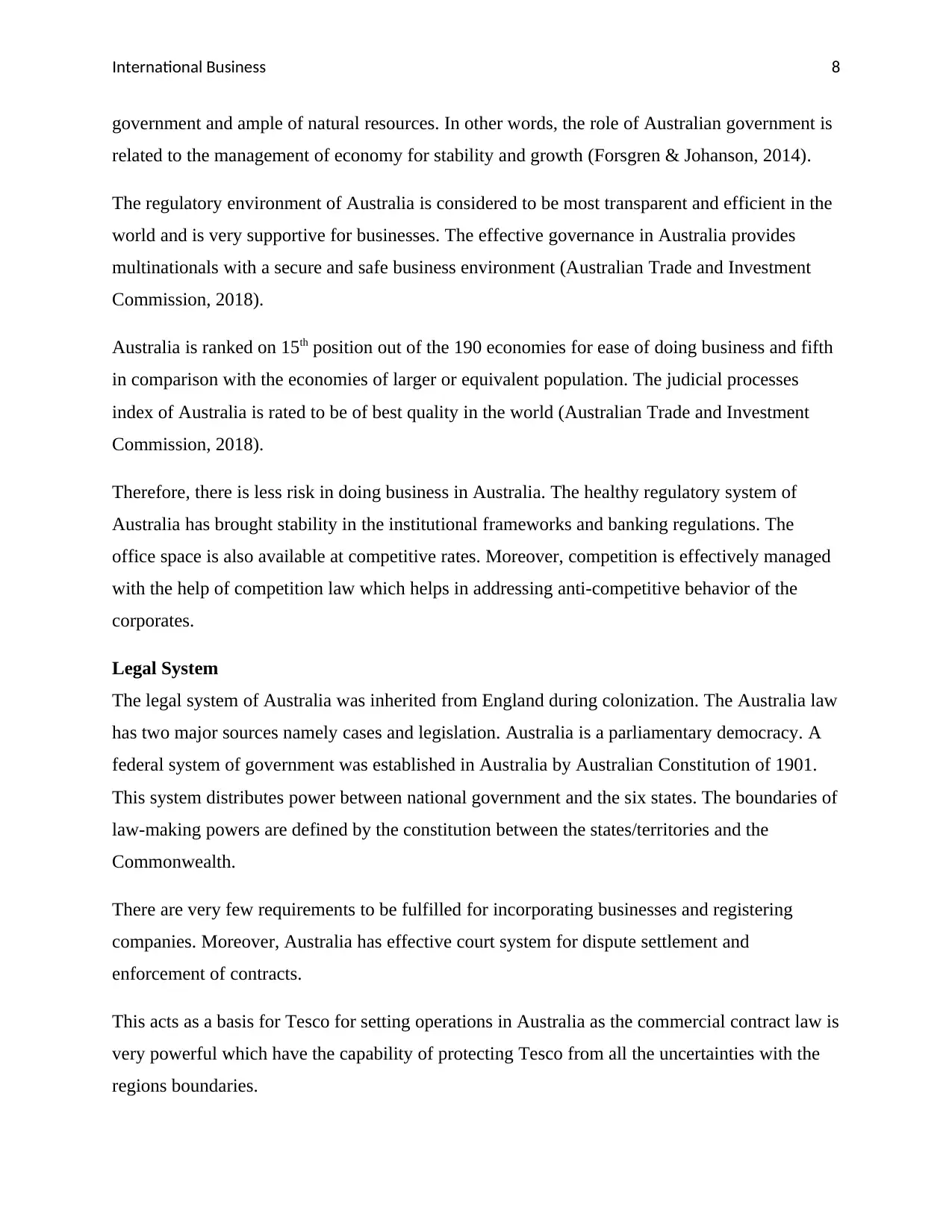
International Business 8
government and ample of natural resources. In other words, the role of Australian government is
related to the management of economy for stability and growth (Forsgren & Johanson, 2014).
The regulatory environment of Australia is considered to be most transparent and efficient in the
world and is very supportive for businesses. The effective governance in Australia provides
multinationals with a secure and safe business environment (Australian Trade and Investment
Commission, 2018).
Australia is ranked on 15th position out of the 190 economies for ease of doing business and fifth
in comparison with the economies of larger or equivalent population. The judicial processes
index of Australia is rated to be of best quality in the world (Australian Trade and Investment
Commission, 2018).
Therefore, there is less risk in doing business in Australia. The healthy regulatory system of
Australia has brought stability in the institutional frameworks and banking regulations. The
office space is also available at competitive rates. Moreover, competition is effectively managed
with the help of competition law which helps in addressing anti-competitive behavior of the
corporates.
Legal System
The legal system of Australia was inherited from England during colonization. The Australia law
has two major sources namely cases and legislation. Australia is a parliamentary democracy. A
federal system of government was established in Australia by Australian Constitution of 1901.
This system distributes power between national government and the six states. The boundaries of
law-making powers are defined by the constitution between the states/territories and the
Commonwealth.
There are very few requirements to be fulfilled for incorporating businesses and registering
companies. Moreover, Australia has effective court system for dispute settlement and
enforcement of contracts.
This acts as a basis for Tesco for setting operations in Australia as the commercial contract law is
very powerful which have the capability of protecting Tesco from all the uncertainties with the
regions boundaries.
government and ample of natural resources. In other words, the role of Australian government is
related to the management of economy for stability and growth (Forsgren & Johanson, 2014).
The regulatory environment of Australia is considered to be most transparent and efficient in the
world and is very supportive for businesses. The effective governance in Australia provides
multinationals with a secure and safe business environment (Australian Trade and Investment
Commission, 2018).
Australia is ranked on 15th position out of the 190 economies for ease of doing business and fifth
in comparison with the economies of larger or equivalent population. The judicial processes
index of Australia is rated to be of best quality in the world (Australian Trade and Investment
Commission, 2018).
Therefore, there is less risk in doing business in Australia. The healthy regulatory system of
Australia has brought stability in the institutional frameworks and banking regulations. The
office space is also available at competitive rates. Moreover, competition is effectively managed
with the help of competition law which helps in addressing anti-competitive behavior of the
corporates.
Legal System
The legal system of Australia was inherited from England during colonization. The Australia law
has two major sources namely cases and legislation. Australia is a parliamentary democracy. A
federal system of government was established in Australia by Australian Constitution of 1901.
This system distributes power between national government and the six states. The boundaries of
law-making powers are defined by the constitution between the states/territories and the
Commonwealth.
There are very few requirements to be fulfilled for incorporating businesses and registering
companies. Moreover, Australia has effective court system for dispute settlement and
enforcement of contracts.
This acts as a basis for Tesco for setting operations in Australia as the commercial contract law is
very powerful which have the capability of protecting Tesco from all the uncertainties with the
regions boundaries.
⊘ This is a preview!⊘
Do you want full access?
Subscribe today to unlock all pages.

Trusted by 1+ million students worldwide
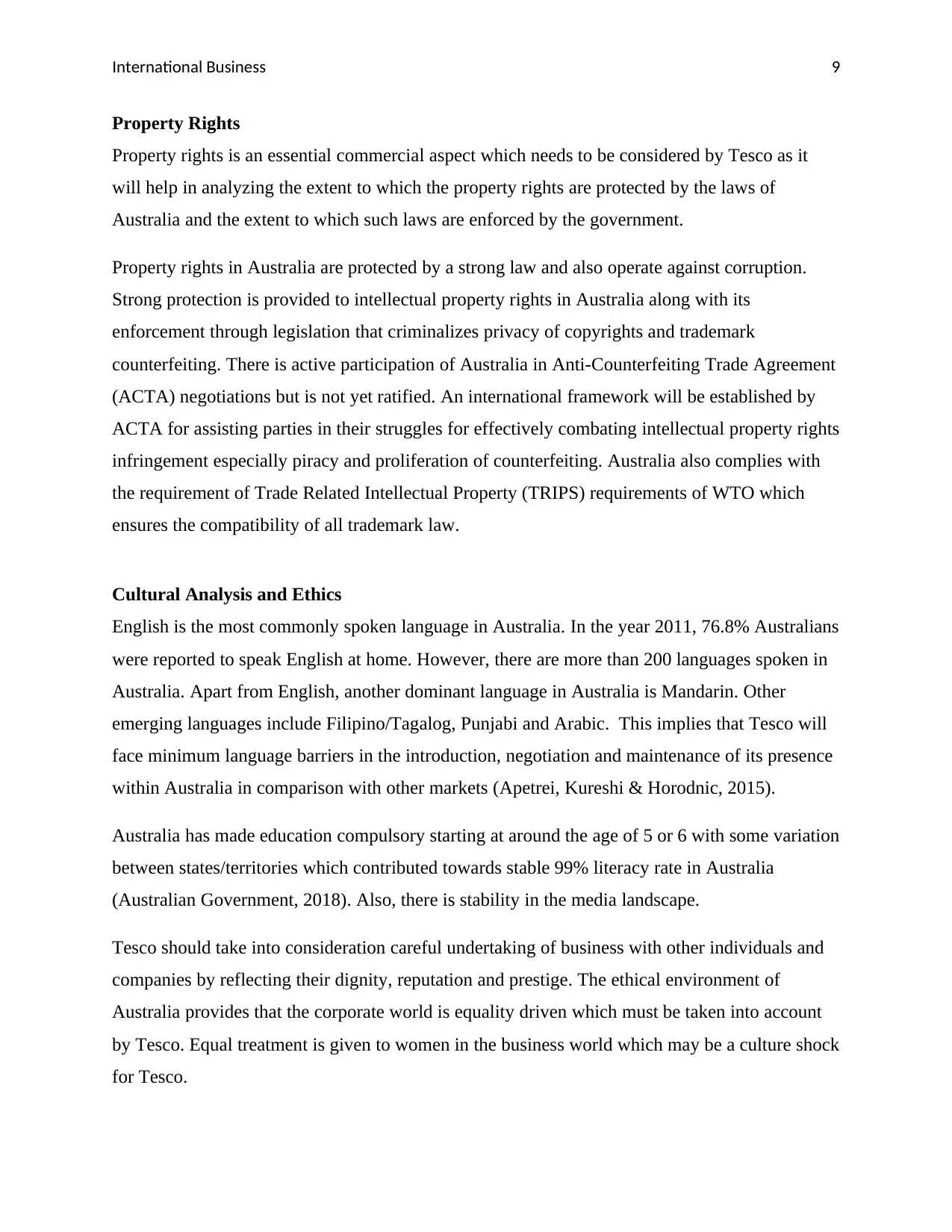
International Business 9
Property Rights
Property rights is an essential commercial aspect which needs to be considered by Tesco as it
will help in analyzing the extent to which the property rights are protected by the laws of
Australia and the extent to which such laws are enforced by the government.
Property rights in Australia are protected by a strong law and also operate against corruption.
Strong protection is provided to intellectual property rights in Australia along with its
enforcement through legislation that criminalizes privacy of copyrights and trademark
counterfeiting. There is active participation of Australia in Anti-Counterfeiting Trade Agreement
(ACTA) negotiations but is not yet ratified. An international framework will be established by
ACTA for assisting parties in their struggles for effectively combating intellectual property rights
infringement especially piracy and proliferation of counterfeiting. Australia also complies with
the requirement of Trade Related Intellectual Property (TRIPS) requirements of WTO which
ensures the compatibility of all trademark law.
Cultural Analysis and Ethics
English is the most commonly spoken language in Australia. In the year 2011, 76.8% Australians
were reported to speak English at home. However, there are more than 200 languages spoken in
Australia. Apart from English, another dominant language in Australia is Mandarin. Other
emerging languages include Filipino/Tagalog, Punjabi and Arabic. This implies that Tesco will
face minimum language barriers in the introduction, negotiation and maintenance of its presence
within Australia in comparison with other markets (Apetrei, Kureshi & Horodnic, 2015).
Australia has made education compulsory starting at around the age of 5 or 6 with some variation
between states/territories which contributed towards stable 99% literacy rate in Australia
(Australian Government, 2018). Also, there is stability in the media landscape.
Tesco should take into consideration careful undertaking of business with other individuals and
companies by reflecting their dignity, reputation and prestige. The ethical environment of
Australia provides that the corporate world is equality driven which must be taken into account
by Tesco. Equal treatment is given to women in the business world which may be a culture shock
for Tesco.
Property Rights
Property rights is an essential commercial aspect which needs to be considered by Tesco as it
will help in analyzing the extent to which the property rights are protected by the laws of
Australia and the extent to which such laws are enforced by the government.
Property rights in Australia are protected by a strong law and also operate against corruption.
Strong protection is provided to intellectual property rights in Australia along with its
enforcement through legislation that criminalizes privacy of copyrights and trademark
counterfeiting. There is active participation of Australia in Anti-Counterfeiting Trade Agreement
(ACTA) negotiations but is not yet ratified. An international framework will be established by
ACTA for assisting parties in their struggles for effectively combating intellectual property rights
infringement especially piracy and proliferation of counterfeiting. Australia also complies with
the requirement of Trade Related Intellectual Property (TRIPS) requirements of WTO which
ensures the compatibility of all trademark law.
Cultural Analysis and Ethics
English is the most commonly spoken language in Australia. In the year 2011, 76.8% Australians
were reported to speak English at home. However, there are more than 200 languages spoken in
Australia. Apart from English, another dominant language in Australia is Mandarin. Other
emerging languages include Filipino/Tagalog, Punjabi and Arabic. This implies that Tesco will
face minimum language barriers in the introduction, negotiation and maintenance of its presence
within Australia in comparison with other markets (Apetrei, Kureshi & Horodnic, 2015).
Australia has made education compulsory starting at around the age of 5 or 6 with some variation
between states/territories which contributed towards stable 99% literacy rate in Australia
(Australian Government, 2018). Also, there is stability in the media landscape.
Tesco should take into consideration careful undertaking of business with other individuals and
companies by reflecting their dignity, reputation and prestige. The ethical environment of
Australia provides that the corporate world is equality driven which must be taken into account
by Tesco. Equal treatment is given to women in the business world which may be a culture shock
for Tesco.
Paraphrase This Document
Need a fresh take? Get an instant paraphrase of this document with our AI Paraphraser
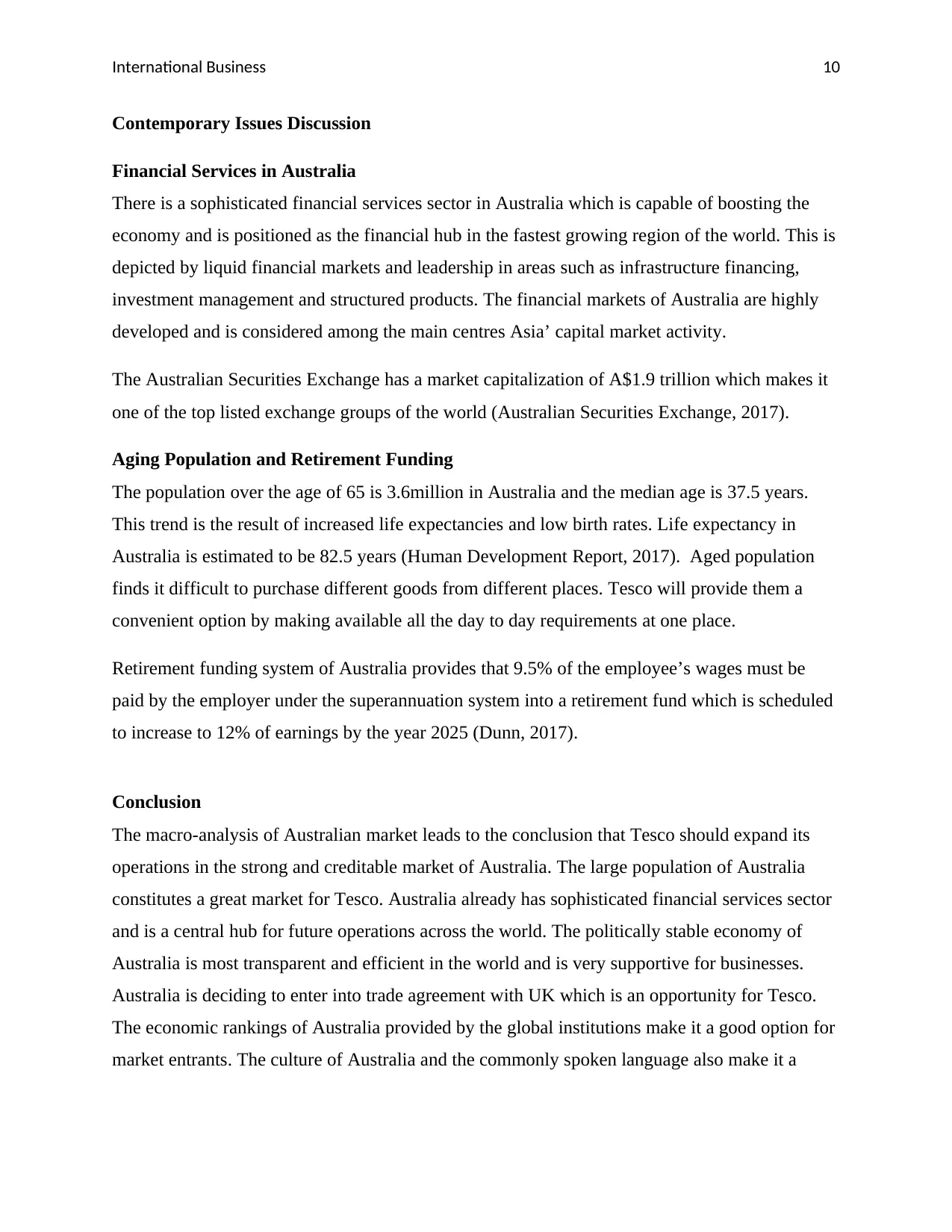
International Business 10
Contemporary Issues Discussion
Financial Services in Australia
There is a sophisticated financial services sector in Australia which is capable of boosting the
economy and is positioned as the financial hub in the fastest growing region of the world. This is
depicted by liquid financial markets and leadership in areas such as infrastructure financing,
investment management and structured products. The financial markets of Australia are highly
developed and is considered among the main centres Asia’ capital market activity.
The Australian Securities Exchange has a market capitalization of A$1.9 trillion which makes it
one of the top listed exchange groups of the world (Australian Securities Exchange, 2017).
Aging Population and Retirement Funding
The population over the age of 65 is 3.6million in Australia and the median age is 37.5 years.
This trend is the result of increased life expectancies and low birth rates. Life expectancy in
Australia is estimated to be 82.5 years (Human Development Report, 2017). Aged population
finds it difficult to purchase different goods from different places. Tesco will provide them a
convenient option by making available all the day to day requirements at one place.
Retirement funding system of Australia provides that 9.5% of the employee’s wages must be
paid by the employer under the superannuation system into a retirement fund which is scheduled
to increase to 12% of earnings by the year 2025 (Dunn, 2017).
Conclusion
The macro-analysis of Australian market leads to the conclusion that Tesco should expand its
operations in the strong and creditable market of Australia. The large population of Australia
constitutes a great market for Tesco. Australia already has sophisticated financial services sector
and is a central hub for future operations across the world. The politically stable economy of
Australia is most transparent and efficient in the world and is very supportive for businesses.
Australia is deciding to enter into trade agreement with UK which is an opportunity for Tesco.
The economic rankings of Australia provided by the global institutions make it a good option for
market entrants. The culture of Australia and the commonly spoken language also make it a
Contemporary Issues Discussion
Financial Services in Australia
There is a sophisticated financial services sector in Australia which is capable of boosting the
economy and is positioned as the financial hub in the fastest growing region of the world. This is
depicted by liquid financial markets and leadership in areas such as infrastructure financing,
investment management and structured products. The financial markets of Australia are highly
developed and is considered among the main centres Asia’ capital market activity.
The Australian Securities Exchange has a market capitalization of A$1.9 trillion which makes it
one of the top listed exchange groups of the world (Australian Securities Exchange, 2017).
Aging Population and Retirement Funding
The population over the age of 65 is 3.6million in Australia and the median age is 37.5 years.
This trend is the result of increased life expectancies and low birth rates. Life expectancy in
Australia is estimated to be 82.5 years (Human Development Report, 2017). Aged population
finds it difficult to purchase different goods from different places. Tesco will provide them a
convenient option by making available all the day to day requirements at one place.
Retirement funding system of Australia provides that 9.5% of the employee’s wages must be
paid by the employer under the superannuation system into a retirement fund which is scheduled
to increase to 12% of earnings by the year 2025 (Dunn, 2017).
Conclusion
The macro-analysis of Australian market leads to the conclusion that Tesco should expand its
operations in the strong and creditable market of Australia. The large population of Australia
constitutes a great market for Tesco. Australia already has sophisticated financial services sector
and is a central hub for future operations across the world. The politically stable economy of
Australia is most transparent and efficient in the world and is very supportive for businesses.
Australia is deciding to enter into trade agreement with UK which is an opportunity for Tesco.
The economic rankings of Australia provided by the global institutions make it a good option for
market entrants. The culture of Australia and the commonly spoken language also make it a
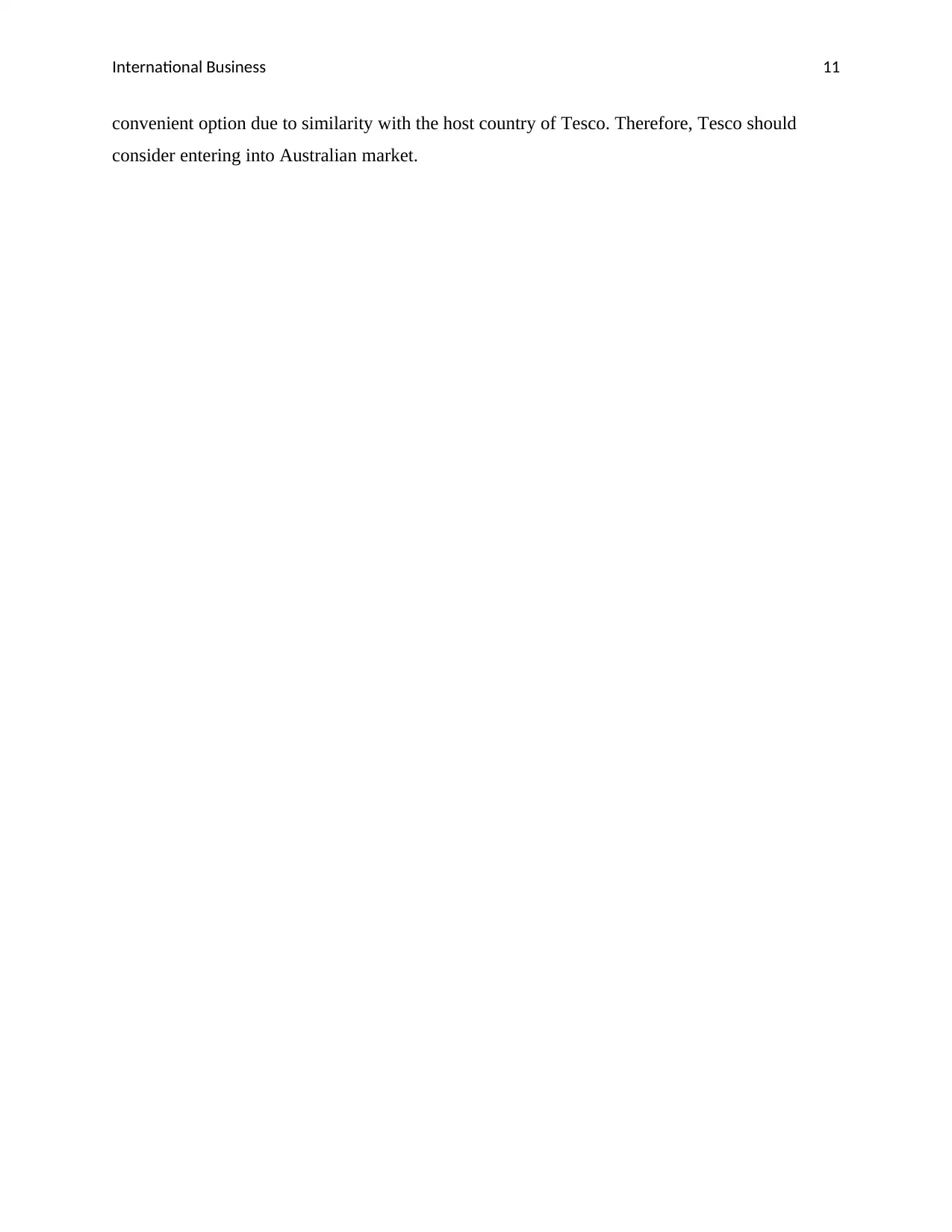
International Business 11
convenient option due to similarity with the host country of Tesco. Therefore, Tesco should
consider entering into Australian market.
convenient option due to similarity with the host country of Tesco. Therefore, Tesco should
consider entering into Australian market.
⊘ This is a preview!⊘
Do you want full access?
Subscribe today to unlock all pages.

Trusted by 1+ million students worldwide
1 out of 14
Related Documents
Your All-in-One AI-Powered Toolkit for Academic Success.
+13062052269
info@desklib.com
Available 24*7 on WhatsApp / Email
![[object Object]](/_next/static/media/star-bottom.7253800d.svg)
Unlock your academic potential
Copyright © 2020–2026 A2Z Services. All Rights Reserved. Developed and managed by ZUCOL.



